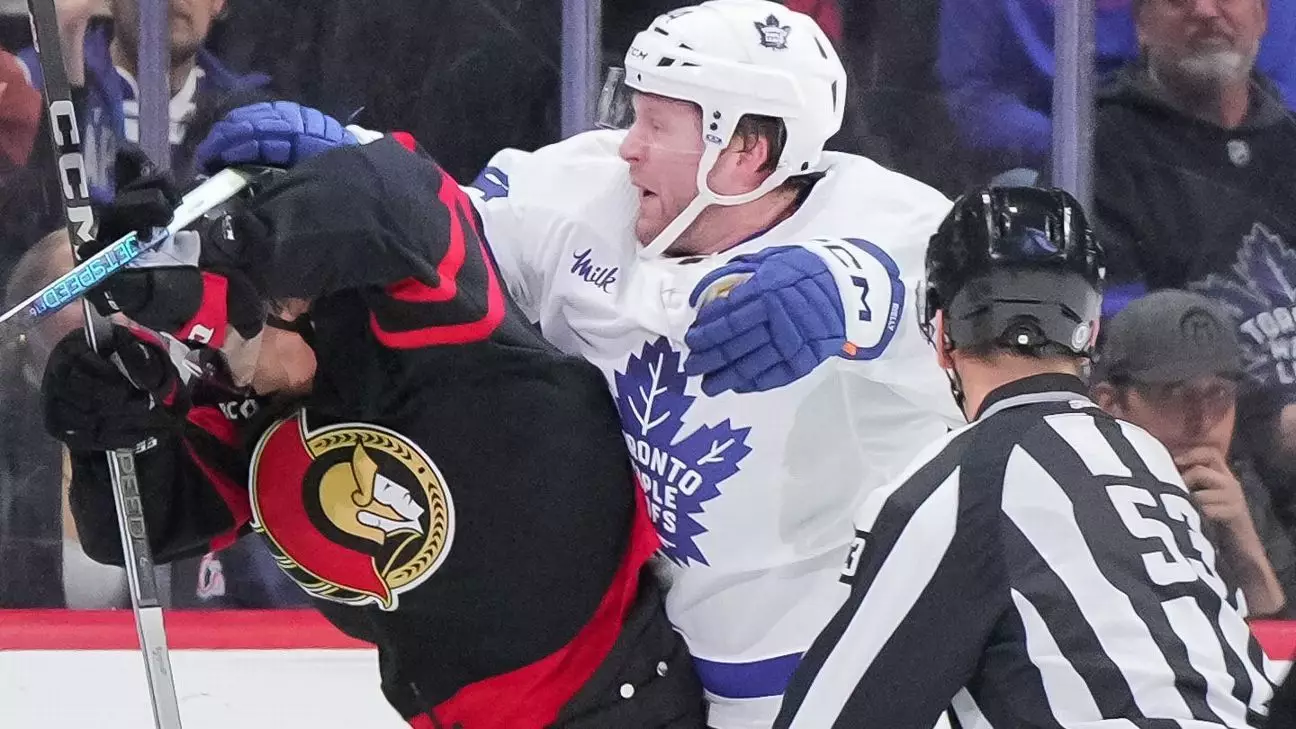The recent suspension of Toronto Maple Leafs defenseman Morgan Rielly by the NHL Department of Player Safety has sparked a heated debate among hockey fans and experts alike. Rielly was penalized for delivering a cross-check to the head of Ottawa Senators forward Ridly Greig during a game on Saturday night. The imposed five-game suspension has left many questioning whether the punishment fits the crime and whether Rielly’s actions were justified in the context of the game. Let us delve into the incident and its aftermath to critically analyze the situation.
The NHL Player Safety characterized Rielly’s cross-check as an intentional, forceful strike to an opponent’s head, executed with his stick. They describe the act as an attempt to exact retribution on an opponent well after a goal had been scored. This depiction paints Rielly in a negative light, portraying him as an aggressor who used his stick as a weapon to harm his opponent. However, it is crucial to explore the incident from multiple perspectives to gain a comprehensive understanding of the situation.
The incident occurred after Greig’s unconventional empty-net goal, which deviated from the typical behavior expected in the NHL. Instead of sliding the puck into the net, Greig opted for a powerful slap shot from close distance. This unorthodox approach elicited a strong reaction from Rielly and the Maple Leafs, who felt that Greig’s action warranted a response. Captain John Tavares stated that his teammates would “stand their ground when necessary,” reflecting the belief within the team that Rielly’s actions were appropriate under the circumstances.
Greig’s provocative empty-netter has sparked a leaguewide debate about the boundaries of sportsmanship in hockey. While some argue that Greig broke an unspoken rule by delivering such a powerful shot, others believe that Rielly’s response was too severe. These differing opinions highlight the subjective nature of sportsmanship and how it is interpreted within the NHL. However, it is essential to consider whether Rielly’s actions were an instinctive response or a calculated act of aggression.
Critics of Rielly’s suspension point out that similar incidents in the past have resulted in smaller penalties. For instance, last season, Los Angeles Kings forward Blake Lizotte received a one-game suspension for a cross-check to the head of Winnipeg Jets defenseman Josh Morrissey during a physical play. Additionally, Calgary Flames forward Andrew Mangiapane earned a one-game suspension for cross-checking Seattle’s Jared McCann in the neck while he was down on the ice. These examples raise questions about the consistency of the NHL’s disciplinary measures and whether Rielly’s punishment is proportionate to his actions.
One crucial aspect that the NHL Player Safety considered in Rielly’s suspension is the context in which the incident occurred. The fact that the cross-check took place after an empty-net goal, with only a few seconds remaining in the game, was a significant factor in their decision. They argue that the altercation was not part of the normal course of play, unlike other instances where cross-checks to the head only resulted in minor suspensions. This contextual analysis sheds light on the NHL’s perspective and the reasoning behind the length of Rielly’s suspension.
To further explore the circumstances surrounding Rielly’s suspension, we can draw parallels with David Perron’s cross-check on Ottawa defenseman Artem Zub. Perron, a forward for the Detroit Red Wings, received a six-game suspension that he has since appealed. Like Rielly, Perron argued that his stick made contact with the body before striking his opponent’s head. However, the NHL Player Safety determined that Rielly’s incident was not comparable to Perron’s, as Rielly had ample time to choose a different course of action. This comparison highlights the subjective nature of such decisions and the challenges of establishing consistent standards in the NHL.
As the Toronto Maple Leafs compete for a playoff spot, losing their top defenseman for five games due to this suspension could have significant implications. Rielly is an integral part of the team, leading in points and minutes played among defensemen. The absence of such a key player will undoubtedly affect the team’s performance during his suspension period. This situation raises questions about the overall impact of such penalties on teams and whether the consequences are proportionate to the offense.
The suspension of Morgan Rielly has ignited a passionate debate in the hockey community. While the NHL Player Safety portrayed his actions as a deliberate strike to an opponent’s head, the context, sportsmanship, and consistency in disciplinary measures all play a role in shaping our understanding of the incident. Ultimately, it is up to individual fans and experts to form their own opinions on the matter and contribute to the ongoing dialogue surrounding player safety and fair play in the NHL.


Leave a Reply